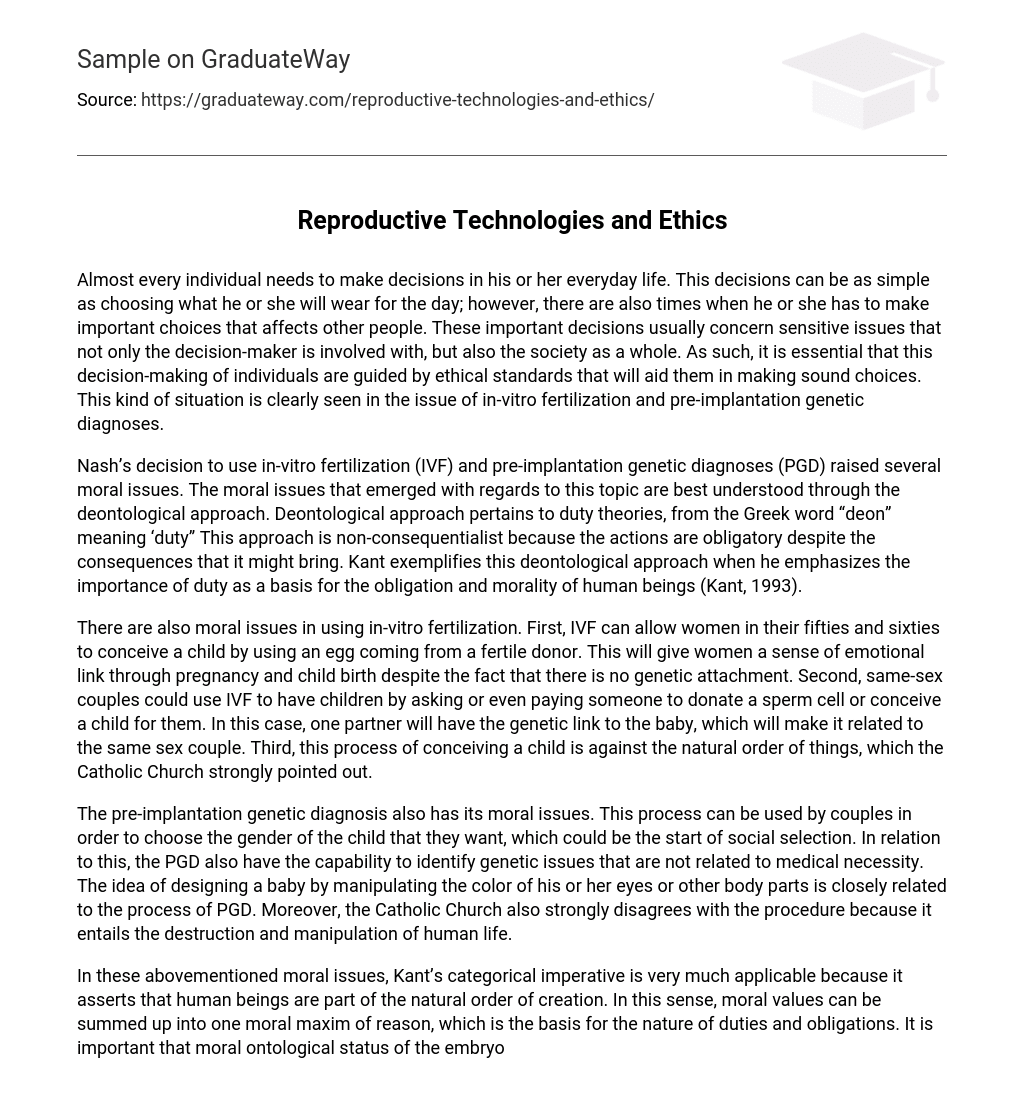Almost every individual needs to make decisions in his or her everyday life. This decisions can be as simple as choosing what he or she will wear for the day; however, there are also times when he or she has to make important choices that affects other people. These important decisions usually concern sensitive issues that not only the decision-maker is involved with, but also the society as a whole. As such, it is essential that this decision-making of individuals are guided by ethical standards that will aid them in making sound choices. This kind of situation is clearly seen in the issue of in-vitro fertilization and pre-implantation genetic diagnoses.
Nash’s decision to use in-vitro fertilization (IVF) and pre-implantation genetic diagnoses (PGD) raised several moral issues. The moral issues that emerged with regards to this topic are best understood through the deontological approach. Deontological approach pertains to duty theories, from the Greek word “deon” meaning ‘duty” This approach is non-consequentialist because the actions are obligatory despite the consequences that it might bring. Kant exemplifies this deontological approach when he emphasizes the importance of duty as a basis for the obligation and morality of human beings (Kant, 1993).
There are also moral issues in using in-vitro fertilization. First, IVF can allow women in their fifties and sixties to conceive a child by using an egg coming from a fertile donor. This will give women a sense of emotional link through pregnancy and child birth despite the fact that there is no genetic attachment. Second, same-sex couples could use IVF to have children by asking or even paying someone to donate a sperm cell or conceive a child for them. In this case, one partner will have the genetic link to the baby, which will make it related to the same sex couple. Third, this process of conceiving a child is against the natural order of things, which the Catholic Church strongly pointed out.
The pre-implantation genetic diagnosis also has its moral issues. This process can be used by couples in order to choose the gender of the child that they want, which could be the start of social selection. In relation to this, the PGD also have the capability to identify genetic issues that are not related to medical necessity. The idea of designing a baby by manipulating the color of his or her eyes or other body parts is closely related to the process of PGD. Moreover, the Catholic Church also strongly disagrees with the procedure because it entails the destruction and manipulation of human life.
In these abovementioned moral issues, Kant’s categorical imperative is very much applicable because it asserts that human beings are part of the natural order of creation. In this sense, moral values can be summed up into one moral maxim of reason, which is the basis for the nature of duties and obligations. It is important that moral ontological status of the embryo is given importance. According to the book written by Jeffrey Olsen, Julie Van Camp, and Vincent Barry (2004) entitled Applying Ethics, there are various arguments as to what stage of development an embryo becomes a human being that makes this being entitled to a moral status. Nevertheless, it specifies that the point wherein the sperm cell already penetrated the egg cell and produces a zygote can already be regarded as a human being that possesses life. In this sense, using IVF and PGD clearly disregard the natural law. These processes are artificial forms of conceiving a child and it do not give due respect to the moral ontological status of an embryo to be conceived in a natural way.
IVF and PGD also violate moral standards that are similar to the one that cloning disregards because it attempts to unethically experiment on the very life of a child to-be. Manipulating the genetic composition of a soon to be human being makes the creation of life a mere mode of manufacturing that is literally “handmade” rather than following the natural order of things (Olen et. al, 2004). In a deontological perspective, adhering to these processes are not duty bound because as Kant said, moral values are derived from natural duties, which is disregarded by artificial methods of conceiving due to the fact that it veers away from the natural order of creation.
References
- Kant, I. (1993). Grounding of the Metaphysic of Morals with “On a Supposed Right to Lie Because of Philanthropic Concerns” (I. Ellington, Trans.). Indianapolis: Hackett Publishing Company.
- Olsen, J., Van Camp, J.C., & Barry, V. (2004). Applying Ethics. New York: Wadsworth Publishing.





